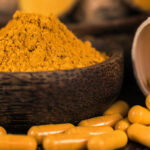Studies presented at ACR 2022 revealed that patients can significantly benefit from eating more plant-based foods and exercising, while turmeric is ultimately ineffective.
Improving general health and wellbeing through simple integrative interventions reduces disease activity for rheumatoid arthritis patients, according to research presented at ACR Convergence 2022.
A team of Dutch researchers presented their work examining the effectiveness of the ‘Plants for Joints’ program, an integrative intervention program promoting a plant-based diet, exercise and stress management.
In around 80 patients with RA disease activity ranging from low to moderate, the authors found that participants enrolled in the program had a mean 28-joint Disease Activity Score (DAS28) score that was 0.9 lower than that of the control group receiving standard care alone. This reduced disease activity was identified at the eight-week follow-up, and continued to be seen at the sixteen-week period.
In addition, those in the program lost around four kilograms more on average than control participants. They also experienced significant improvements for other measures of RA disease activity, including fat mass and biochemical markers such as haemoglobin A1c, LDL and triglycerides, although glucose and HDL stayed the same.
The presentation was a timely accompaniment to the ACR’s new guidelines outlining best-practice approaches to integrative interventions for treating RA, including diet and exercise, which were also presented at ACR Convergence 2022.
According to rheumatologist and clinical pharmacologist Dr David Liew, integrative intervention programs like the Plants for Joints program could be very significant for clinicians treating patients with low to moderate RA.
“While the value of individual components of this program is also yet to be determined, operationalising therapeutic interventions in this area with real impact for RA disease activity represents an exciting development in an area without enough good evidence,” Dr Liew wrote in an article for RheumNow.
Also presented at ACR Convergence 2022 was a new study from India that showed curcumin, the active component of turmeric, is not an effective alternative for current RA therapies, despite its global popularity among osteoarthritis and rheumatoid arthritis patients.
Researchers based in Kochi measured data from around 200 patients with well-controlled RA looking to cease their current treatments, to see whether curcumin could prevent RA flares versus placebo for 52 weeks.
Despite using a formulation with high bioavailability, the team found that curcumin made no difference to the frequency of RA flares compared to the placebo treatment, nor did it improve rates of relapse-free survival. In fact, more patients in the curcumin group experienced flares than those in the control cohort.
Reports of adverse effects were similar for both groups, with infection being reported by one member of each, one case of a benign tumour in the curcumin group, and two psoriasis diagnoses recorded in the placebo group.
The researchers concluded that even a long duration of highly active curcumin was not a suitable replacement for conventional RA therapies.
“In RA patients who are in remission in whom conventional synthetic DMARDs (csDMARDs) were being systematically tapered, the addition of curcumin, despite having a good bioavailability, did not affect the flare-free survival or time to flare,” they wrote.





